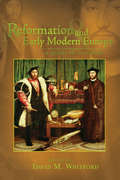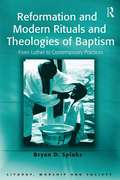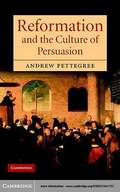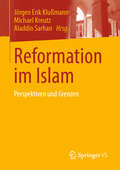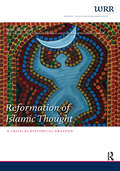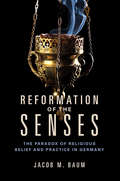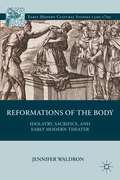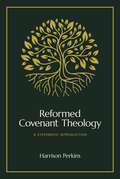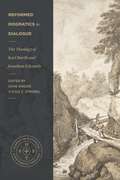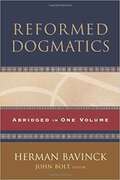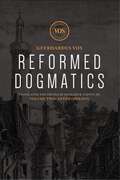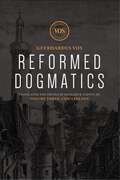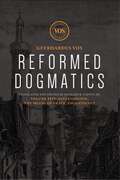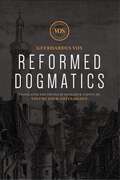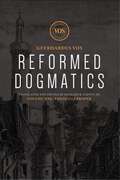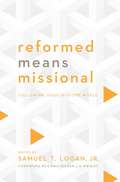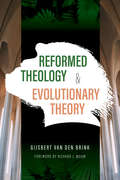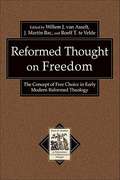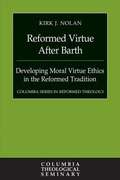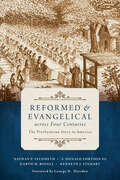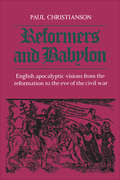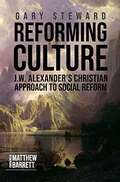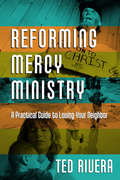- Table View
- List View
Reformation Unbound
by Karl Gunther"Fundamentally revising the understanding of the nature and intellectual contours of early English Protestantism, Karl Gunther argues that sixteenth- century English evangelicals were calling for reforms and envisioning godly life in ways that were far more radical than have hitherto been appreciated. Typically such ideas have been seen as later historical developments, associated especially with radical puritanism, but Gunther's work draws attention to their development in the earliest decades of the English Reformation. Along the way, the book offers new interpretations of central episodes in this period of England's history, such as the "Troubles at Frankfurt" under Mary and the Elizabethan vestments controversy. By shedding new light on early English Protestantism, the book ultimately casts the later development of puritanism in a new light, enabling us to re-situate it in a history of radical Protestant thought that reaches back to the beginnings of the English Reformation itself"--
Reformation and Early Modern Europe: A Guide to Research (Sixteenth Century Essays & Studies #79)
by David M. WhitfordContinuing the tradition of historiographic studies, this volume provides an update on research in Reformation and early modern Europe. Written by expert scholars in the field, these eighteen essays explore the fundamental points of Reformation and early modern history in religious studies, European regional studies, and social and cultural studies. Authors review the present state of research in the field, new trends, key issues scholars are working with, and fundamental works in their subject area, including the wide range of electronic resources now available to researchers.Reformation and Early Modern Europe: A Guide to Research is a valuable resource for students and scholars of early modern Europe.
Reformation and Early Modern Europe: A Guide to Research (Sixteenth Century Essays & Studies #79)
by David M. WhitfordContinuing the tradition of historiographic studies, this volume provides an update on research in Reformation and early modern Europe. Written by expert scholars in the field, these eighteen essays explore the fundamental points of Reformation and early modern history in religious studies, European regional studies, and social and cultural studies. Authors review the present state of research in the field, new trends, key issues scholars are working with, and fundamental works in their subject area, including the wide range of electronic resources now available to researchers.Reformation and Early Modern Europe: A Guide to Research is a valuable resource for students and scholars of early modern Europe.
Reformation and Modern Rituals and Theologies of Baptism: From Luther to Contemporary Practices (Liturgy, Worship and Society Series)
by Bryan D. SpinksPresenting a comprehensive survey of the historical underpinnings of baptismal liturgies and theologies, Bryan Spinks presents an ecumenically and geographically wide-ranging survey and discussion of contemporary baptismal rites, practice and reflection, and sacramental theology. Writing within a clear chronological framework, Bryan Spinks presents two simultaneous volumes on Baptismal Liturgy and Theology. Early and Medieval Rituals and Theologies of Baptism summarizes the understandings of baptism in the New Testament and the development of baptismal reflection and liturgical rites throughout Syrian, Egyptian, Roman and African regions. In this second volume, Reformation and Modern Rituals and Theologies of Baptism, Spinks traces developments through the Reformation, liturgies in the eighteenth and nineteenth centuries, and explores important new ecumenical perspectives on developments of twentieth-century sacramental discussion. Present practices of Baptist, Amish, as well as Methodist, Roman Catholic, Lutheran, Reformed and Anglican denominations are also examined.
Reformation and the Culture of Persuasion
by Andrew PettegreeWhy did people choose the Reformation? What was in the evangelical teaching that excited, moved or persuaded them? Andrew Pettegree tackles these questions directly by re-examining the reasons that moved millions to this decisive and traumatic break with a shared Christian past. He charts the separation from family, friends, and workmates that adherence to the new faith often entailed and the new solidarities that emerged in their place. He explores the different media of conversion through which the Reformation message was communicated and the role of drama, sermons, song and the book. His findings offer a persuasive new answer to the critical question of how the Reformation could succeed as a mass movement in an age before mass literacy.
Reformation im Islam: Perspektiven und Grenzen
by Jörgen Erik Klußmann Michael Kreutz Aladdin SarhanDass der Islam in der modernen Welt, die von Demokratie, Säkularismus und Fortschritt geprägt ist, nur bestehen könne, wenn er eine Reformation durchlaufe, wird von den einen behauptet, von den anderen bestritten und ist Gegenstand einer bis heute andauernden Debatte, die sich mindestens bis auf das frühe 20. Jahrhundert zurückverfolgen lässt. Dieser Sammelband lässt Stimmen für und wider eine Reformation im Islam zu Wort kommen und rückt die Debatte in das Licht aktueller Ereignisse und Herausforderungen, zu denen nicht zuletzt der Aufstieg des Salafismus gehört. Der InhaltEinführungReformation als HerausforderungIslam und PolitikReformation und die Geschlechterfrage Vergleichende PerspektivenDie ZielgruppenPhilosophenTheologenSozialwissenschaftlerPolitik- und ReligionswissenschaftlerHistorikerDie HerausgeberJörgen Erik Klußmann ist Studienleiter an der Evangelischen Akademie im Rheinland und nebenberuflich Coach und Trainer für soziokulturelle und religiöse Sensibilisierung sowie für systemische Konflikttransformation.Dr. Michael Kreutz ist Politologe und Orientalist in Bochum mit den Arbeitsschwerpunkten Moderne Geschichte des Nahen Ostens und Südosteuropas, politische Ideengeschichte, Europa und der Islam, Religion und Politik.Aladdin Sarhan ist Islamwissenschaftlicher Referent und Sachverständiger in der Abteilung Staatsschutz des Landeskriminalamts Rheinland-Pfalz.
Reformation of Islamic Thought: A Critical Historical Analysis (WRR Verkenningen)
by Nasr Abu ZaydEver since the dramatic events of September 11, 2001 the fundamentalist and exclusivist trend prevails in most presentations of Islamic thinking. Indeed, these events have given extremists and fundamentalists a much more prominent position than they might ever have dreamt of.In Reformation of Islamic Thought, the prominent Egyptian scholar Nasr Abû Zayd examines the positive, liberal, and inclusive reaction embedded in the writings of Muslim thinkers. He takes the reader on a critical journey across the Muslim World, where Muslim thinkers from Egypt and Iran to Indonesia seek to divest Islam of traditionalistic and legalistic interpretation. Instead, these thinkers stress the value of a cultural, enlightened Islam, and an individualistic faith.For many, the dogmatic Islam established by the conservatives and supported by totalitarian political regimes is outdated; they want it replaced by a spiritual and ethical Islam. To what extent are these reformist thinkers engaged in a genuine renewal of Islamic thought? Do they succeed in escaping the traditionalist trap of presenting a purely negative image of the West?
Reformation of the Senses: The Paradox of Religious Belief and Practice in Germany (Studies in Sensory History)
by Jacob M. BaumWe see the Protestant Reformation as the dawn of an austere, intellectual Christianity that uprooted a ritualized religion steeped in stimulating the senses--and by extension the faith--of its flock. Historians continue to use the idea as a potent framing device in presenting not just the history of Christianity but the origins of European modernity. Jacob M. Baum plumbs a wealth of primary source material from the fifteenth and sixteenth centuries to offer the first systematic study of the senses within the religious landscape of the German Reformation. Concentrating on urban Protestants, Baum details the engagement of Lutheran and Calvinist thought with traditional ritual practices. His surprising discovery: Reformation-era Germans echoed and even amplified medieval sensory practices. Yet Protestant intellectuals simultaneously cultivated the idea that the senses had no place in true religion. Exploring this paradox, Baum illuminates the sensory experience of religion and daily life at a crucial historical crossroads. Provocative and rich in new research, Reformation of the Senses reevaluates one of modern Christianity's most enduring myths.
Reformations Of The Body
by Jennifer WaldronThis project takes the human body and the bodily senses as joints that articulate new kinds of connections between church and theatre and overturns a longstanding notion about theatrical phenomenology in this period.
Reformed Covenant Theology: A Systematic Introduction
by Harrison Perkins"Perkins is an expert in his field and very much a pastor. … You will not be disappointed." —From the foreword by Ligon Duncan See Christ and his work more clearly. Learn the biblical basis for the Reformed confessions. Understand the role of grace and works in your salvation. Covenant shapes our life with God. In Reformed Covenant Theology: A Systematic Introduction, Harrison Perkins shows how Christ and his work are the heart of that covenant relationship. Since God lives in covenant with his redeemed people, covenant theology provides a framework for Christians to grow in their life with God, to read the Bible, and to love the church.
Reformed Dogmatics in Dialogue: The Theology of Karl Barth and Jonathan Edwards (Studies in Historical and Systematic Theology)
by Anizor, Uche and Strobel, Kyle C.Two Reformed giants in conversation Jonathan Edwards and Karl Barth are widely considered to be the greatest North American and Swiss theologians, respectively. Though situated in vastly different contexts and separated by nearly two hundred years, they shared intriguing similarities. Both employed exegesis, theology, and philosophy with ease. Both reasoned with unique quality, depth, and timelessness. Both resisted liberal shifts of their day while remaining creative thinkers. And both were Reformed without uncritically assuming the tradition. Edited by Uche Anizor and Kyle C. Strobel, Reformed Dogmatics in Dialogue engages Edwards and Barth for constructive dogmatics. Each chapter brings these theologians into conversation on classic theological categories, such as the doctrine of God, atonement, and ecclesiology, as well as topics of particular interest to both, such as aesthetics and philosophy. As with all great theologians, Edwards and Barth continue to illuminate Christian doctrine. Readers will appreciate their rigor of thought and devotion to Christ.
Reformed Dogmatics: Abridged in One Volume
by John Bolt Herman BavinckHerman Bavinck's four-volume Reformed Dogmatics is one of the most important theological works of the twentieth century. The recently completed English translation has received wide acclaim. <p><p> Now John Bolt, one of the world's leading experts on Bavinck and editor of Bavinck's four-volume set, has abridged the work in one volume, offering students, pastors, and lay readers an accessible summary of Bavinck's masterwork. This volume presents the core of Bavinck's thought and offers explanatory materials, making available to a wider audience some of the finest Dutch Reformed theology ever written.
Reformed Dogmatics: Anthropology
by Geerhardus J. VosLike books, people can become 'classics.' Great in their day, but richer and more fulfilling with time. Not yet a classic, Vos's never-before-published Reformed Dogmatics is more like a lost Shakespeare play recently discovered. --Michael Horton Until recently, Reformed Dogmatics was only available in its original Dutch. But now you too can access Geerhardus Vos' monumental work of systematic theology. This brand-new English translation was edited by biblical theologian and Vos expert, Richard B. Gaffin, Jr. In Volume Two, Anthropology, Vos discusses: Humanity Sin The covenant of grace The body and the soul God's covenants And more
Reformed Dogmatics: Christology
by Geerhardus J. VosLike books, people can become 'classics.' Great in their day, but richer and more fulfilling with time. Not yet a classic, Vos's never-before-published Reformed Dogmatics is more like a lost Shakespeare play recently discovered. --Michael Horton Until recently, Reformed Dogmatics was only available in its original Dutch. But now you too can access Geerhardus Vos' monumental work of systematic theology. This brand-new English translation was edited by biblical theologian and Vos expert, Richard B. Gaffin, Jr. In Volume Three, Christology, Vos discusses: The person of Christ Christ's two natures The incarnation The work of Christ Christ's death and resurrection The nature of Christ' sacrifice Christ's offices And more
Reformed Dogmatics: Ecclesiology, The Means of Grace, Eschatology
by Geerhardus J. Vos"Like books, people can become 'classics.' Great in their day, but richer and more fulfilling with time. Not yet a classic, Vos's never-before-published Reformed Dogmatics is more like a lost Shakespeare play recently discovered." --Michael Horton Until recently, Reformed Dogmatics was only available in its original Dutch. But now you too can access Geerhardus Vos' monumental work of systematic theology. This brand-new English translation was edited by biblical theologian and Vos expert, Richard B. Gaffin, Jr. In Volume Five: Ecclesiology, The Means of Grace, Eschatology, Vos discusses: --The essence and organization of the church --The Word of God, baptism, and the Lord's Supper as means of grace --The doctrine of last things in both individual and general terms
Reformed Dogmatics: Soteriology
by Geerhardus J. Vos"Like books, people can become 'classics.' Great in their day, but richer and more fulfilling with time. Not yet a classic, Vos's never-before-published Reformed Dogmatics is more like a lost Shakespeare play recently discovered." --Michael Horton Until recently, Reformed Dogmatics was only available in its original Dutch. But now you too can access Geerhardus Vos' monumental work of systematic theology. This brand-new English translation was edited by biblical theologian and Vos expert, Richard B. Gaffin, Jr. In Volume Four, Soteriology, Vos discusses: The nature of salvation The evidence of salvation The order of salvation ( ordo salutis) And more
Reformed Dogmatics: Theology Proper
by Geerhardus J. VosLike books, people can become 'classics.' Great in their day, but richer and more fulfilling with time. Not yet a classic, Vos's never-before-published Reformed Dogmatics is more like a lost Shakespeare play recently discovered. --Michael Horton Until recently, Reformed Dogmatics was only available in its original Dutch. But now you too can access Geerhardus Vos' monumental work of systematic theology. This brand-new English translation was edited by biblical theologian and Vos expert, Richard B. Gaffin, Jr. In Volume One, Theology Proper, Vos discusses: The doctrine of God The Trinity God's acts Creation Predestination Providence And more
Reformed Means Missional: Following Jesus into the World
by Samuel T. LoganChristians are not on a mission for God; his church is on his mission--the mission of bringing the grace of Christ to sinners; the mission of bringing the whole world into obedience to Christ; and the mission of filling the world with his fame and glory. Being on God's mission means following Jesus into the world, often an evil and frightening place. It is a place of idolatry, relativism, and secularism; it is a place where sexual abuse and child abuse occur; it is a place of pain and poverty and disease; it is a place of sexual dysfunction. But it was to this place that Jesus came, and we do him honor as we follow him into the world bringing the good news of the total redeeming work of Christ.Reformed Means Missional gathers Reformed leaders from all across the globe to demonstrate why and how the church must be on God's mission of bringing grace, holiness, compassion, and justice to a world of sin and suffering.
Reformed Theology and Evolutionary Theory
by Gijsbert Van den BrinkMany books aim to help beginners explore whether or not evolutionary science is compatible with Christian faith. This one probes more deeply to ask: What do we learn from modern evolutionary science about key issues that are of special theological concern? And what does Christian theology, especially in its Reformed expressions, say about those same key issues? Gijsbert van den Brink begins by describing the layers of meaning in the phrase &“evolutionary theory&” and exploring the question of how to interpret the Bible with regard to science. He then works through five key areas of potential conflict between evolutionary theory and Christian faith, spelling out scientific findings and analyzing Christian doctrinal concerns along the way. His conclusion: although some traditional doctrinal interpretations must be adjusted, evolutionary science is no obstacle to classical Christian faith.
Reformed Thought on Freedom: The Concept of Free Choice in Early Modern Reformed Theology
by J. Martin Bac Richard Muller Willem J. Van Asselt Roelf T. Te VeldeThis book makes a major contribution to historical scholarship on the problem of free choice and to contemporary debates over determinism and divine foreknowledge of future events. It fills a significant gap in Reformed knowledge by presenting sources in translation and commentary on works of major importance to the Protestant tradition that have been neglected for centuries. The book begins with an introductory discussion of free choice and the Reformed tradition and then moves on to examine the concept of freedom in the work of six early modern Reformers: Girolamo Zanchi, Franciscus Junius, Franciscus Gomarus, Gisbertus Voetius, Francesco Turrettini, and Bernardinus de Moor. It will be valued by all students of Reformed theology.
Reformed Virtue After Barth: Developing Moral Virtue Ethics in the Reformed Tradition
by Kirk J. NolanWith its focus on the traditions and communities that form us over the course of a lifetime, virtue ethics has richly expanded our understanding of what the Christian life can look like. Yet its emphasis on human virtues and habits of mind and life seems inconsistent with the Reformed tradition's insistence that sin lies at the heart of the human condition. For this reason, virtue ethics seems out of place in Reformed theology, especially in the company of the Reformed tradition's greatest twentieth-century theologian, Karl Barth. In this new addition to the Columbia Series in Reformed Theology, Kirk Nolan argues that Barth's theology actually proves virtue ethics can be compatible with the Reformed tradition. Rather than see virtue as an inevitable and natural process of growth, Barth helps us understand that development in the Christian life comes through a process of repetition and renewal, and that all virtue comes solely as a gift from God. Nolan establishes an important bridge between Reformed moral teaching and the tradition of virtue ethics.
Reformed and Evangelical across Four Centuries: The Presbyterian Story in America
by Garth M. Rosell Kenneth J. Stewart Nathan Feldmeth S. Donald Fortson IIIA definitive history of evangelical Presbyterianism in America Reformed and Evangelical across Four Centuries tells the story of the Presbyterian church in the United States, beginning with its British foundations and extending to its present-day expression in multiple American Presbyterian denominations. This account emphasizes the role of the evangelical movement in shaping various Presbyterian bodies in America, especially in the twentieth century amid increasing departures from traditional Calvinism, historic orthodoxy, and a focus on biblical authority. Particular attention is also given to crucial elements of diversity in the Presbyterian story, with increasing numbers of African American, Latino/a, and Korean American Presbyterians—among others—in the twenty-first century. Overall, this book will be a bountiful resource to anyone curious about what it means to be Presbyterian in the multidimensional American context, as well as to anyone looking to understand this piece of the larger history of Christianity in the United States.
Reformers and Babylon: English Apocalyptic Visions from the Reformation to the Eve of the Civil War
by Paul Kenneth ChristiansonStarting in the 1530s with John Bale, English reformers found in the apocalyptic mysteries of the Book of Revelation a framework for reinterpreting the history of Christianity and explaining the break from the Roman Catholic Church. Identifying the papacy with antichrist and the Roman Catholic Church with Babylon, they pictured the reformation as a departure from the false church that derived its jurisdiction from the devil. Those who took the initiative in throwing off the Roman yoke acted as instruments of God in the cosmic warfare against the power of evil that raged in the latter days of the world. The reformation ushered in the beginning of the end as prophesied by St. John.Reformers and Babylon examines the English apocalyptic tradition as developed in the works of religious thinkers both within and without the Established Church and distinguishes the various streams into which the tradition split. By the middle of Elizabeth's reign the mainstream apocalyptic interpretation was widely accepted within the Church of England. Under Charles I, however, it also provided a vocabulary of attack for critics of the Established Church. Using the same weapons that their ancestors had used to justify the reformation in the first place, reformers like John Bastwick, Henry Burton, William Prynne, and John Lilburne attacked the Church of England's growing sympathies with Romish ways and eventually prepared parliamentarians to take up arms against the royalist forces whom they saw as the forces of antichrist. Scholars of sixteenth- and seventeenth-century intellectual history will welcome this closely reasoned study of the background of religious dissent which underlay the politics of the time.
Reforming Culture: J. W. Alexander's Christian Approach To Social Reform
by Matthew Barrett Gary StewardHow should we address the social ills in our culture? How should we respond to the social and economic inequalities around us? James W. Alexander (1804-1859) thought deeply about these problems and wrote extensively about how these issues might be addressed from a Christian perspective. The son of Princeton Seminary's first faculty member, Alexander rose to prominence in the nineteenth century as a Christian leader in Virginia, New Jersey, and New York City. While he authored numerous books and articles, Alexander's contribution to evangelical thought has largely been overlooked. Alexander was deeply concerned about the economic, political, and social structures of antebellum American society, and he left behind a great deal of material that addressed these issues. In an age when social reformers traversed America with an abundance of novel ideas and utopian schemes, Alexander believed that the Christian gospel and the influence of Christian truth was the best means approach for bringing about lasting good in the world around us. Alexander's thoughts on government, economics, education, and race continue to be relevant for our own day. While the complexion of our social ills may have changed, the solution to needs of our culture have largely remained the same.
Reforming Mercy Ministry: A Practical Guide to Loving Your Neighbor
by Ted RiveraReforming Mercy Ministry

